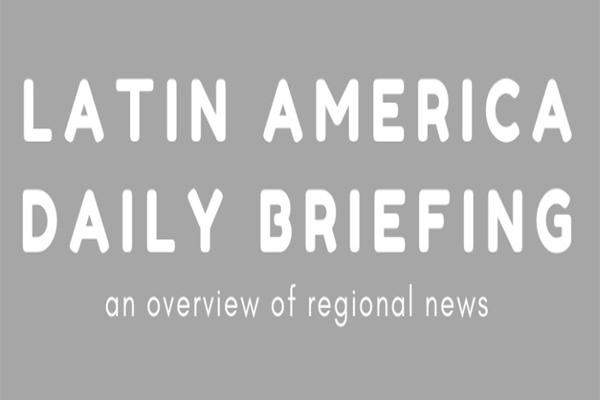
Leftist presidential candidate Gustavo Petro maintains a comfortable lead ahead of next Sunday’s vote, reports the Associated Press. A former rebel with a strong anti-establishment discourse, Petro would become the country’s first leftist president, and promised to boost state involvement in the economy.
He has 39 percent voter intent according to La Silla Vacía’s poll aggregator.
Like other recent elections in the region, the race is starkly polarized: Petro will face off against Federico “Fico” Gutiérrez, a former mayor of Medellín who has the support of right-leaning voters and much of the traditional political establishment, explains the Crisis Group’s Elizabeth Dickinson in a Q&A. (Gutiérrez has 25 percent according to La Silla Vacía’s poll aggregator.)
But Rodolfo Hernández, a right-wing populist former mayor of Bucaramanga has risen in the polls and could upend the race, warns James Bosworth at the Latin America Risk Report. “While Hernández’s ideology is clearly right-wing (and more than a little xenophobic), he’s best viewed as an anti-system outsider who can win support from a range of voters outside of his ideology. In that sense, Hernández is somewhat similar to Bolsonaro in 2018.” (Hernández has 20 percent, according to La Silla Vacía.)
The vote comes as armed and criminal groups have “been hollowing out the security gains that followed the signing of the 2016 peace accord between Colombia and the FARC guerrillas,” notes Dickinson.
“The atmosphere here is more tense, uncertain and unstable than any election in at least a decade,” reports the Washington Post, noting an uptick in death threats against Petro that led his campaign to tighten security.
Yesterday, 90 political figures and entities from more than 20 countries released a letter condemning growing violence and persecution ahead of the elections, after Petro’s running-mate, Francisca Márquez, finished a Saturday speech from behind bodyguards with shields. (The Intercept)
Accusations of electoral irregularities and a decline in confidence in government are prompting concern that candidates on any side will claim election fraud. Challenges combined with tight margins could prompt civil unrest.
More Colombia
- La Silla Vacía compares the candidates’ security plans and contrasts them to expert proposals.
- Seventy-seven social leaders have been assassinated so far this year in Colombia, according to Indepaz. (Telesur)
Mexico
- Mexico’s supreme court ruled that immigration agents’ stop and search operations on buses and highways are racist, discriminatory and therefore unconstitutional.The calls into question the role of Mexico’s armed forces, especially the national guard which has been deployed across the country to assist immigration officials, reports the Guardian.
Cuba
- The U.S. “Biden administration has tacitly acknowledged that the wreak-havoc policies they inherited are inimical to US security and diplomatic and humanitarian concerns,” writes Peter Kornbluh in The Nation.
Honduras
- Coca plantations are increasing in Honduras, which was traditionally a transit country on the cocaine highway between South America and the U.S. If left unchecked, it could give rise to a new generation of drug traffickers, and refortify clans of old, much like the shifting of drug routes from the Caribbean to Central America did at the turn of the century, according to the Guardian.
Chile
- Chilean President Gabriel Boric’s short honeymoon period is partially due to the circumstances of his victory: he won the runoff election in December in part due to voters seeking to block his far-right adversary José Antonio Kast, according to Patricio Navia in the Latin America Advisor.
- Other experts argue that high expectations for change in Chile — and the unwieldy Constitutional Convention upon which many pinned their hopes for such reform — are also behind Boric’s dropping popularity. (Latin America Advisor)
Argentina
- Argentine commerce secretary Roberto Feletti, a senior economic official, resigned yesterday due to internal differences within the government over how to contain prices — annual inflation reached 58 percent last month. (Reuters)
Bolivia
- Bolivian student leader Max Mendoza was detained yesterday after a judge ordered a six-month investigation into allegations his long tenure as a state-paid student leader constituted a crime. Prosecutor William Alave said other long-serving student leaders were also being investigated. (Guardian)
Critter Corner
- Conservationists will release 40 red-footed tortoises into Argentina’s El Impenetrable national park in the coming weeks. The animals were rescued from the illegal pet trade in Paraguay, reports the Guardian. While they are native to Argentina, they have not been spotted alive in the country in two decades.
– Jordana Timerman
Latin America Daily Briefing
—
http://latinamericadailybriefing.blogspot.com












